'Why we left!' Britons FURIOUS as Switzerland bans UK vaccine and EU nations erupt
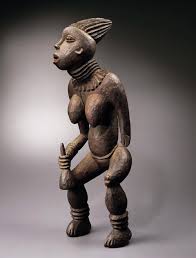









'Why we left!' Britons FURIOUS as Switzerland bans UK vaccine and EU nations erupt
Switzerland's drugs regulator Swissmedic today announced it had delayed approval of the AstraZeneca jab. It comes as a number of European countries have advised against use of the vaccine in older people.
Meanwhile, the EU has been at the centre of an extraordinary row with AstraZeneca - which worked with Oxford University on its jab - over supply shortages.
Express.co.uk readers hit out amid the vaccine backlash.
Commenting on this website, one said: "You couldn't make this up! Some very serious questions to ask themselves in Europe."
Another blasted: "UK envy of world medicine. EU basically extremely incompetent and jealous!!!"
A third commented: "At least we should be able to have our population fully vaccinated by the time the clowns in the EU wake up."
Another wrote: "They are entitled to their viewpoint, I will trust our scientists.
"We are used to working independently, that is why we left the EU and its constraints."

A fifth simply said: "All the more for us then."
One more added: "So why then is the EU almost declaring war on UK accusing UK of stealing supplies.
"Clearly now any consideration we were giving to donate some to the EU is pointless as they will not be using it on the most vulnerable anyway.
"No point in wasting it on them they will just have to wait for the jab they hate so much they are desperate to fight us for. Bizzare really."
Switzerland is waiting for more data on safety, efficacy and quality before giving the AstraZeneca jab the green light.
Swissmedic said in a statement: "As soon as the results have been received, a temporary authorisation according to the rolling procedure could be issued at very short notice.
"The data currently available do not point to a positive decision regarding benefits and risks."
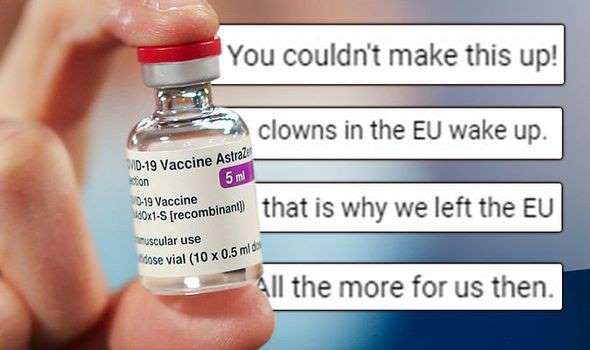
AstraZeneca's jab has already been approved in around 50 countries including the UK.
And the EU's drugs regulator last week approved the use of the vaccine for all adults.
A new study by the University of Oxford found the jab offers protection of 76 percent up to 12 weeks after a single dose and may reduce transmission by 67 percent.
However, some European countries are restricting it to certain age groups, citing a lack of data in older people.
France, Belgium and Germany are among EU countries to recommend the jab is only given to under 65s.
It comes as the UK is pushing ahead with its vaccine rollout. The number of people who have received their first jab has passed 10 million.
The EU has come under heavy criticism over its slow rollout of jabs.
Daily Express: Katie Harris
Faecal transplants could help patients with form of skin cancer
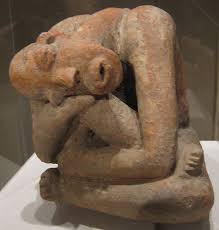


 v
v v
v





Faecal transplants could help patients with form of skin cancer
Faecal transplants could help patients with a dangerous form of skin cancer respond to immunotherapy, research suggests.
Faecal transplants involve stool and the microbes it contains being taken from one individual and introduced into the gut of another person.
The approach has become a promising treatment for recurring clostridium difficile infections, and is also being explored for a host of other conditions including inflammatory bowel disease.
Now researchers say it may also help patients with melanoma – a potentially deadly form of skin cancer that can be treated with immunotherapy.
“[Immunotherapy] works by essentially unleashing the body’s own immune cells against the cancer,” said Dr Diwakar Davar, a co-author of the new study from the University of Pittsburgh. “The problem is that these drugs don’t work perfectly, in that they don’t work all the time.”
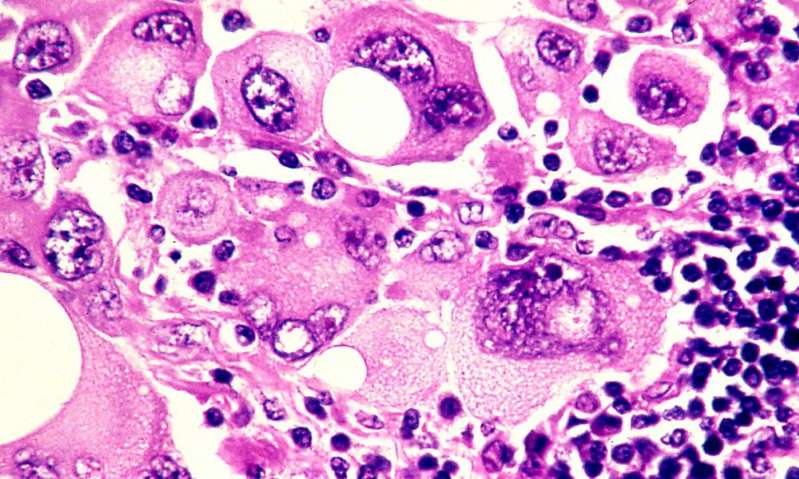
According to Davar, only 30-50% of melanoma patients given immunotherapy respond to it, and even among that group, the response can change over time.
But a growing body of research suggests that such figures could be boosted by turning to the gut.
“What other people have shown [is that] it appears that the microbes that inhabit our gut mediate some measure of response,” said Devar.
Writing in the journal Science, Davar and colleagues report how they took stool from seven individuals who had previously shown either a full or partial response to immunotherapy, called pembrolizumab, for melanoma.
They then screened the stool for potentially harmful viruses, bacteria or fungi before transferring it to patients with melanoma who had previously not responded to the immunotherapy. After receiving the transplant these patients were given pembrolizumab, which was repeated every three weeks, and the patients’ progress was followed for an average period of 12 months.
The results from 15 patients, enrolled between June 2018 and January 2020, who received a faecal transplant reveal that six appeared to show benefits, with three showing a large reduction or complete eradication of the cancer.
“The other three had cancers that stopped growing,” said Davar.
The team found that when the 15 patients were taken together, the median overall survival time after the faecal transplant was seven months. But for the six patients who responded to immunotherapy after receiving a faecal transplant, it was 14 months. Benefits were also seen when the team looked at how long patients lived with the cancer without it getting worse.
Further work showed that the six transplant recipients that went on to respond to pembrolizumab developed a community of gut microbes similar to those of the donor stool, in particular becoming richer in two broad types of bacteria, firmicutes and actinobacteria, that have previously been linked to a good response to immunotherapy. They also showed a drop in particular cells and proteins that suppress the body’s immune response to the cancer, and signs of a boosted immune response.
“The bacteria work by reducing the amount of adverse immune cells,” said Devar.
The study has limitations, including that it is based on only a small group of patients.
It is also unclear why the faecal transplant only led to benefits in six of the transplant recipients although the team offer a number of possibilities, including that some patients might not have had a big enough shift in their gut microbe to change their response to the immunotherapy, or that the patients’ immune system was unable to tackle the cancer regardless of the microbes present.
Davar said the next step is to carry out trials with larger groups of patients, and for other cancers that are treated with immunotherapy. And there’s another goal: replacing faecal transplants with a pill containing the necessary collection of microbes.
Prof Jennifer Wargo of the University of Texas MD Anderson Cancer Center, who was not involved in the study, said the work was exciting, but there is a long way to go, with research needed on ways to determine the best stool donors and key components of the stool.
“This really does paint a bright future for being able to modulate gut microbes to improve responses to cancer treatment and maybe even improve overall immune health,” she said
Reference: The Guardian: Nicola Davis
What Russia's Sputnik V vaccine means for the UK









What Russia's Sputnik V vaccine means for the UK
What’s the story?
It was the race the Kremlin was desperate to win.
The global effort to find and develop an effective vaccine for the coronavirus was not just a matter of life and death for the countries that took part: it was a matter of national pride.
Yesterday interim trial data showed that the Russian vaccine, known as Sputnik V, is almost 92 per cent effective against symptomatic Covid after two doses, bringing it in line with many of the jabs that have been developed in the West.
Phase three trials reported by the Gamaleya National Research Centre, which developed the vaccine in Moscow, show little or no side effects in 20,000 participants.
The Russian vaccine works in a similar way to the Oxford/AstraZeneca jab: by placing the genetic material of Covid-19 into a harmless adenovirus, then injecting it into the patient.
So-called “viral vector” vaccines are easier to store and cheaper to produce – making them more convenient than “spike protein” jabs, like the Pfizer and Moderna offerings.
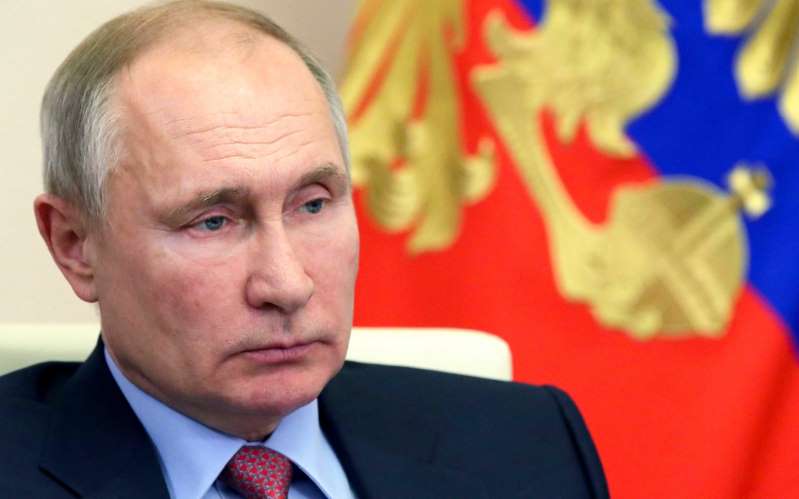
For the Russian government, the apparent safety of the Sputnik vaccine represents not just a national and public health victory but a relief, since authorities began distributing the vaccine before the results of the trials.
More than 1.5 million people, including the Telegraph’s Moscow Correspondent Nataliya Vasilyeva, have already received it. That gamble appears to have paid off.
Ian Jones, professor at the University of Reading, and Polly Roy, professor at the London School of Hygiene & Tropical Medicine, yesterday pointed out that the jab’s development “has been criticised for unseemly haste, corner cutting, and an absence of transparency”.
“But the outcome reported here is clear and the scientific principle of vaccination is demonstrated,” they said.
“Another vaccine can now join the fight to reduce the incidence of Covid-19.”
Others are more circumspect. Boris Johnson, the Prime Minister, has been reluctant to address the news about Sputnik V, despite his enthusiastic support for Pfizer/BioNTech, Moderna and Oxford/AstraZeneca.
In a briefing with reporters yesterday, the Prime Minister’s spokesman insisted any comment on vaccines was a matter for scientists, not Downing Street. Asked why Mr Johnson had not yet welcomed the news, the spokesman would not comment further.
Mr Johnson’s reluctance to welcome the news was shared by his Cabinet, who made no mention of the vaccine all day.
Looking back
That could be explained by the fact that the news follows months of anxiety about the UK’s own vaccine rollout, which began with the first NHS jab in December.
Russia’s first dose, meanwhile, was injected in August. Vladimir Putin, the President, announced on television that his daughter was one of the first to receive it.
The Russians have not been shy about treating the development of the jab as a competition, either. The product’s name is a reference to Sputnik 1, the first artificial satellite to be launched from Earth.
That satellite was launched by the Soviet Union in 1957, and marked both a major turning point in the space race and bitter defeat for the United States.
For UK politicians, who pride themselves on their “world-beating” international comparisons, Russia’s vaccine success is problematic, while the timing of the announcement could not have been worse.
Hours later, Dominic Raab, the Foreign Secretary, issued a statement condemning the Russian courts for their imprisonment of Alexei Navalny, an opposition politician who returned to the country following a near-miss poisoning with a
toxic nerve agent, thought to have been carried out by Russian intelligence services.
Anything else?
All that could mean the UK is unlikely to want to cooperate with Russia on the rollout of its jab – but Russian scientists have already suggested a partnership with Britain.
Kirill Dmitriev, chief executive of the group that funded Sputnik V and a close ally of Mr Putin, said combining a shot of his vaccine with one of the AstraZeneca jab could “actually work better because immunity gets stronger”.
“This idea, called heterogeneous boosting, is at the core of the Sputnik vaccine because we use two different shots and we believe this is the best way to fight with mutations and this also fosters a partnership between different vaccine manufacturers,” he told the BBC.
The proposal presents ministers with an interesting diplomatic question, as well as potential concerns about vaccine efficacy and logistics.
Mixing supplies of Sputnik and AstraZeneca would mean unprecedented co-operation between public health bodies between the two countries. Before coronavirus, the last major incident Public Health England dealt with was the poisoning of Sergei Skripal in Salisbury by Russian GRU agents, which marked a significant cooling of relations.
Elsewhere, both countries also want to use vaccines as a diplomatic tool overseas. With supplies running short and almost all manufacturers based in richer countries, inoculations could become a major source of soft power for the states that have funded their development – including both the UK and Russia.
Matt Hancock, the Health Secretary, has already announced the UK will use its war chest of more than 400 million vaccines to help poorer countries around the world once Britons have been protected. Russia, meanwhile, has taken tens of millions of orders from Egypt, Nepal, Brazil, Mexico and Argentina for Sputnik.
Both will likely use vaccines to strengthen their influence in regions of diplomatic interest, as well as through politically neutral schemes like the WHO’s Covax.
The Refresher take
The development of any new vaccine is a boon for the global fight against coronavirus because the disease will not be brought under control until it has been tackled everywhere.
But the apparent success of the Sputnik V jab presents Russia’s Western rivals with an interesting dilemma: to embrace and support Mr Putin’s vaccine and consider combining it with their own, or to continue to ignore it.
Mr Johnson’s current strategy, to continue to talk up Britain’s successes while jealously guarding its supplies for the first-phase rollout, will come to an end when all UK adults have received their doses.
What he and others do next about Sputnik V could mark a major shift in Russia’s relationship with the West and in the course of the pandemic.
Reference: The Telegraph : Tony Diver
Rare double transplant gives man new face and two hands
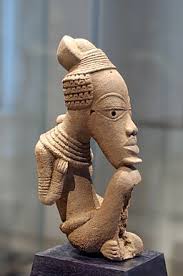












Rare double transplant gives man new face and two hands
Doctors say a 22-year-old man, badly burned in a car crash, is recovering well after receiving a rare face and hands transplant.
Mr DiMeo fell asleep at the wheel after working a night shift. His car hit a curb, flipped over and burst into flames.
A passing driver who saw the accident pulled him out of the burning wreckage.
But the young man's injuries were so severe that he was forced to spend months in a medically-induced coma and undergo 20 reconstructive surgeries and multiple skin grafts to treat his extensive third-degree burns.
Once it became clear conventional surgeries could not help him regain full vision or use of his hands, Mr DiMeo's medical team - of more than 140 people - began preparing for the risky transplant.
Doctors amputated both of Mr DiMeo's hands, replacing them mid-forearm and connecting nerves, blood vessels and 21 tendons with hair-thin stitches.
They also transplanted a full face, including the forehead, eyebrows, nose, eyelids, lips, both ears and underlying facial bones.
He is now relearning how to smile, blink, pinch and squeeze.
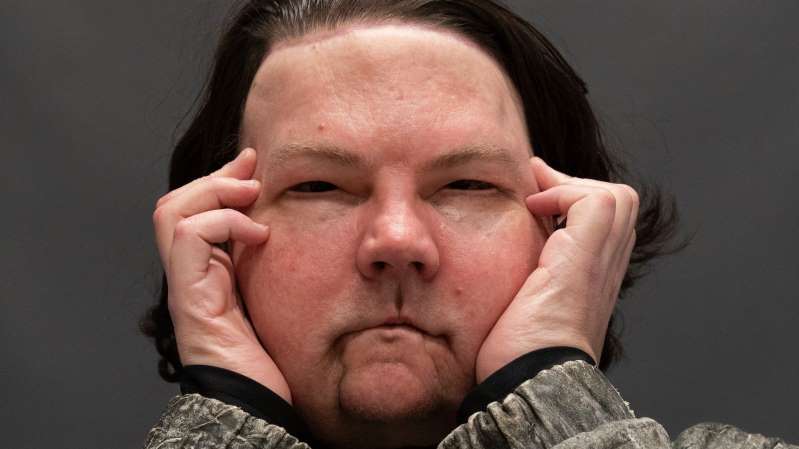
Mr DiMeo said: "They had to amputate the tip of my fingers and my face was burned.
"I had little slits in my eyes, so it was like looking through like a chain-linked fence."
"I knew it would be baby steps all the way. You've got to have a lot of motivation, a lot of patience.
"And you've got to stay strong through everything."
Experts say it appears the surgery at New York University's Langone Health centre was a success, but warn it will take some time to say for sure.
Worldwide, surgeons have completed only 18 face transplants and 35 hand transplants.
But simultaneous face and double hand transplants are extremely rare and have only been tried twice before.
The first attempt was in 2009 on a patient in Paris who died about a month later from complications.
Two years later, Boston doctors tried it again on a woman who was mauled by a chimpanzee, but ultimately had to remove the transplanted hands days later.
Dr Bohdan Pomahac, a surgeon at Boston's Brigham and Women's Hospital who led the second attempt, said: "The fact they could pull it off is phenomenal.
"I know first hand it's incredibly complicated. It's a tremendous success."
Mr DiMeo will be medication for life for the transplants and will need continued rehabilitation to gain sensation and function in his new face and hands.
Doctors had estimated he only had a 6% chance of finding a match compatible with his immune system. They also wanted to find someone with the same gender, skin tone and hand dominance.
And the search for a suitable donor was also scuppered by the COVID-19 pandemic. During New York City's first surge of cases, members of the transplant unit were reassigned to work in coronavirus wards.
A donor was finally identified in Delaware and the 23-hour procedure was completed a few days later.
Dr Eduardo Rodriguez, who led the medical team of more than 140 people, said: "The possibility of us being successful based on the track record looked slim.
"It's not like someone has done this many times before and we have a kind of a schedule, a recipe to follow."
Since leaving hospital in November, Mr DiMeo has been in intensive rehabilitation, devoting hours daily to physical, occupational and speech therapy.
"Rehab was pretty intense," he said, and involves a lot of "retraining yourself to do stuff on your own again".
During a recent session, he practiced raising his eyebrows, opening and closing his eyes, puckering his mouth, giving a thumbs up and whistling.
Mr DiMeo can feel his new forehead and his hands get cold. He can now dress and feed himself.
He plays pool and with his dog Buster.
Once an avid gym-goer, he is also working out again - and practicing his golf swing.
"You got a new chance at life. You really can't give up," he said.
Reference:: Sky News:
Articles - Most Read
- Home
- LIVER DIS-EASE AND GALL BLADDER DIS-EASE
- Contacts
- African Wholistics - Medicines, Machines and Ignorance
- African Wholistics -The Overlooked Revolution
- African Holistics - Seduced by Ignorance and Research
- The Children of the Sun-3
- Kidney Stones-African Holistic Health
- The Serpent and the RainBow-The Jaguar - 2
- PART ONE: DIS-EASE TREATMENT AND HEALTH-3
- 'Tortured' and shackled pupils freed from Nigerian Islamic school
- King Leopold's Ghost - Introduction
- PART ONE: DIS-EASE TREATMENT AND HEALTH-4
- PART ONE: DIS-EASE TREATMENT AND HEALTH-2
- PART ONE: DIS-EASE TREATMENT AND HEALTH-5
- African Wholistics - Medicine
- Menopause
- The Black Pharaohs Nubian Pharaohs of Ancient Egypt
- The Mystery System
- PART ONE: DIS-EASE TREATMENT AND HEALTH-6
Who's On Line?
We have 149 guests and no members online
Ad Agency Remote
Articles - Latest
- The Male G Spot Is Real—and It's the Secret to an Unbelievable Orgasm
- Herbs for Parasitic Infections
- Vaginal Care - From Pubes to Lubes: 8 Ways to Keep Your Vagina Happy
- 5 Negative Side Effects Of Anal Sex
- Your Herbs and Spices Might Contain Arsenic, Cadmium, and Lead
- Struggling COVID-19 Vaccines From AstraZeneca, BioNTech/Pfizer, Moderna Cut Incidence Of Arterial Thromboses That Cause Heart Attacks, Strokes, British Study Shows
- Cartilage comfort - Natural Solutions
- Stop Overthinking Now: 18 Ways to Control Your Mind Again
- Groundbreaking method profiles gene activity in the living brain
- Top 5 health benefits of quinoa
- Chromolaena odorata - Jackanna Bush
- Quickly Drain You Lymph System Using Theses Simple Techniques to Boost Immunity and Remove Toxins
- Doctors from Nigeria 'facing exploitation' in UK
- Amaranth, callaloo, bayam, chauli
- 9 Impressive Benefits of Horsetail
- Collagen The Age-Defying Secret Of The Stars + Popular Products in 2025
- Sarcopenia With Aging
- How to Travel as a Senior (20 Simple Tips)
- Everything you need to know about mangosteen
